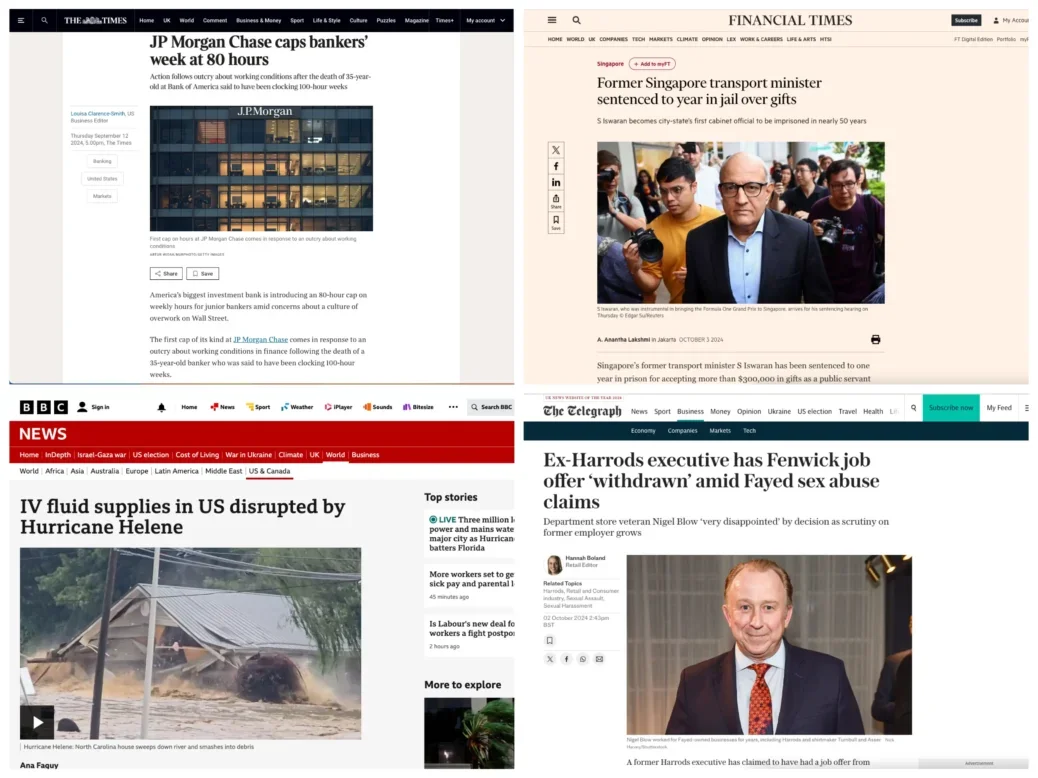
Upmarket UK newsbrands are far less likely to link through to the work of their colleagues at other publishers than tabloid news sites, new Press Gazette research suggests.
Press Gazette assessed recent output from nine leading UK news websites to establish how often they include a hyperlink when repeating information sourced from other publishers.
In the snapshot survey we found that the Mirror and The Sun were the most likely to link to other publishers, doing so in eight out of ten stories assessed at each site.
The Times, Financial Times and Telegraph, on the other hand, each only linked to another news site in one of the ten articles analysed at each and appear to have taken editorial policy decision not to link.
The Guardian and BBC, meanwhile, appeared to link through to their sources slightly less often than not.
Mail Online linked to publisher sources in the majority of articles and the Express in half of the examples we found.
The overall picture is of an industry that routinely avoids linking to sources when lifting information from other sites.
Press Gazette searched each publisher for articles published in recent weeks that featured the word “reported” (i.e. “The New York Times reported…”) and selected from the results the first ten stories that carried information copied from a named third-party news outlet.
Because the research only looked at articles that disclosed they were citing another news outlet, this research does not account for the overall frequency with which the publishers credit their sources: uncredited rewrites of a competitor’s story, for example, would not be picked up in the analysis.
Across all the publishers assessed internal links to other parts of their own websites were common. Many of the publishers would also credit information to "local media" when describing something that had been reported overseas, without identifying or linking to the source.
The Mirror told Press Gazette that it is supportive of linking and that the two articles in which no external link had been inserted were the result of human error.
A spokesperson for The Sun, similarly, said: "The Sun has always been known for breaking great exclusives and we have long campaigned for publishers to receive recognition for their original journalism.
“Alongside expecting to receive this attribution we in turn make every attempt to ensure that we attribute other publications' good stories that we have picked up."
The BBC’s operating licence requires the corporation to link to relevant third parties in its online output, and in its most recent “Delivering our Mission and Public Purposes" report it said that, in a sample of 1,370 articles published across the BBC News and BBC Sport websites, 18% of its output had linked to another media organisation. The BBC declined to comment.
Mail Online declined to comment. The Guardian also declined to comment, but pointed Press Gazette to its editorial code, which instructs its journalists that material "obtained from another organisation should be acknowledged".
The Times, FT and Telegraph had not responded to a request for comment at time of publication.
What's best practice on linking to other news sites?
Gavin Allen, a digital journalism lecturer at Cardiff University’s School of Journalism and a former associate editor at Mirror.co.uk, said there can be a “double incentive” for news sites not to link to competitors: “On the one hand, you're saying ‘we didn't break the story, someone else did’ which may be bad for reputation.
“On the other hand, you're pointing readers away from your website,” which he said may lead them to click away.
Materially, Allen said traffic from backlinks is often “vanishingly small”. Instead, he said, the way un-linked re-reports “might start to cannibalise your traffic is if it’s attracting search away”.
He said: “It’s more a courtesy and an ethics thing as well, I think… If you’re doing stuff based on other people’s work then you should be crediting that work. That would be good practice.”
Search engine optimisation orthodoxy holds that Google gives better rankings to articles that link to relevant third-party websites.
The Association of Online Publishers offers the following guidance on this topic: "Fair attribution is vital to help publishers get credit for the time, money, and effort they put into sourcing, investigating, and producing original content.
"As well as helping direct users to the original source of a story, linking is vitally important for SEO. Google uses links from ‘prominent websites’ as a signal to determine ‘authoritativeness’ – a key factor in determining ranking."
The AOP invites publishers to sign up to the Link Attribution Protocol, a group of publishers who agree to follow best practice on linking and who share a single email point of contact for getting links added to stories.
Scroll down for the full linking results from each of the nine publishers
Email pged@pressgazette.co.uk to point out mistakes, provide story tips or send in a letter for publication on our "Letters Page" blog
